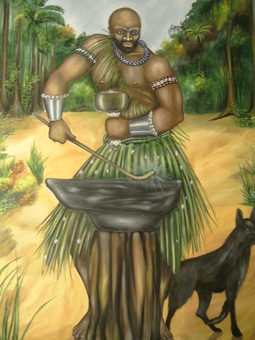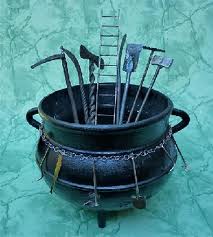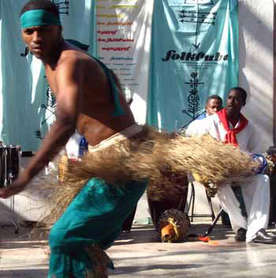Ogun, The Iron Warrior

Ogún, Lord of Metals
Ogún (Oggún) is the owner of all metals and minerals, especially iron. He's associated with knives, machetes, nails, metal tools, firearms and other weapons, as well as mountains. Generally, he's portrayed as a solitary blacksmith or ironmonger who lives alone in the forest. When the Orichas came to earth, Ogún was given the task of clearing the forests with his machete. The patakis (sacred stories) tell us that Ogún's father is Obatalá, his mother is Yemú (Yembó), and his brothers are Eleguá and Ochosi. Often Changó is also mentioned as a brother or half brother. The stories say that Ogún was in love with his mother and wanted to have carnal relations with her, but Eleguá was always on the lookout and stopped him. On one occasion, Ogún escaped Eleguá's watchful eye and forced himself on Yemú, but he was caught in the act by Obatalá. Before Obatalá could punish him, Ogún cursed himself. He told Obatalá that he would go live in the wilderness all alone and devote himself completely to work for the rest of eternity. Only his brother Ochosi, the great hunter, saw him from time to time. Otherwise, Ogún was always alone, working day and night, miserable and unhappy, and he started to spread ofoché (magical powders) around the world to create arayé (tragedy, discord). To save the world from arayé, Ochún, the goddess of love, intervened. She sought out Ogún and seduced him with her beauty and sweetness. After his encounter with Ochún, Ogún calmed down and lost his bitterness. He was married at one time to Oyá, but she left him for Changó; some lineages say the brothers became enemies because of Oyá's infidelity, but other lineages say the rivalry is exaggerated and the two Orichas still work together on occasion.
|
Ogún is the patron of all those who work with metal, mechanics, engineers, policemen, soldiers, surgeons. He knows the secrets of the natural world and can perform powerful witchcraft when the situation calls for it. He has a violent, brusque nature, but he also has a more peaceful side. He's good at farming, raising animals and hunting. Ogún is also the owners of keys and locks, jails, and chains, and he's the foundation on which everything is built. He oversees construction and labor, and is the master of the technology required for human progress and evolution in the material world. In traditional images of Ogún, he wears a close-fitting cap on his head, his chest is bare, he wears a hunter's pouch slung across a shoulder, and around his waist he wears a belt with a long fringe of mariwó (palm fibers), which protects him from evil. Together with Eleguá and Ochosi, he protects the interior entryway of homes.
|
Ogún's Attributes

Ogún's cauldron
Ogún's days of the week are Tuesday and Wednesday, and the 4th day of every month. His feast day is June 29, coinciding with that of Saint Peter. His numbers are combinations of 3 and 7. His eleke (necklace) consists of alternating green and black beads. In some lineages, Ogún's necklace also takes purple, brown or red beads mixed in with the green and black. His priests sometimes wear an achabbá (metal charm bracelet or anklet with tools, machetes, keys, locks and other pieces of metal hanging from it.) Traditionally, Ogún lives in a three-legged metal cauldron with Ochosi, and he's placed next to Eleguá. Eleguá, Ogún, Ochosi and Osun are known as the guerreros (warriors).
Ogún's protection is especially important in questions related to surgery and operations of all kinds, fevers, accidents where there's profuse bleeding, and any kind of wound caused by metal. He likes roasted sweet potatoes, plantains, kola nuts, white beans, smoked fish, toasted corn, palm oil, cane alcohol and cigars. Offerings to Ogún are often left at the railroad tracks, which are one of his symbols. He's syncretized with San Peter, because Peter owns the keys to the kingdom. To a lesser degree, he's also associated with Saint Paul, Saint John the Baptist, Saint Michael, and Saint Rafael. The children of Ogún can be violent, impulsive, and unforgiving, but they are also brave, determined, and never give up hope. They're tireless workers, and they're astute. They're known for their frankness and sincerity, which make people overlook their flaws. In the human body, Ogún inhabits the thorax, which represents vitality and strength.
Ogún's protection is especially important in questions related to surgery and operations of all kinds, fevers, accidents where there's profuse bleeding, and any kind of wound caused by metal. He likes roasted sweet potatoes, plantains, kola nuts, white beans, smoked fish, toasted corn, palm oil, cane alcohol and cigars. Offerings to Ogún are often left at the railroad tracks, which are one of his symbols. He's syncretized with San Peter, because Peter owns the keys to the kingdom. To a lesser degree, he's also associated with Saint Paul, Saint John the Baptist, Saint Michael, and Saint Rafael. The children of Ogún can be violent, impulsive, and unforgiving, but they are also brave, determined, and never give up hope. They're tireless workers, and they're astute. They're known for their frankness and sincerity, which make people overlook their flaws. In the human body, Ogún inhabits the thorax, which represents vitality and strength.

